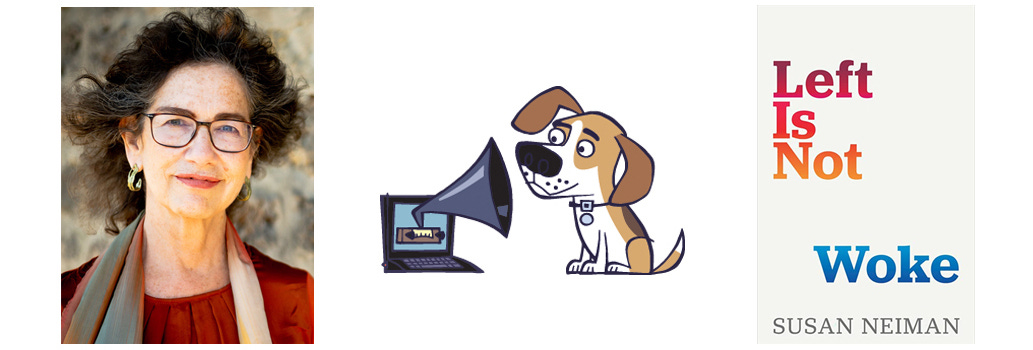Susan is a philosopher and writer focusing on the Enlightenment, moral philosophy, metaphysics and politics. She was professor of philosophy at Yale and Tel Aviv University, and in 2000 assumed her current position as director of the Einstein Forum in Potsdam. She’s the author of nine books, including Evil in Modern Thought, Moral Clarity and Learning from the Germans. Her new book is Left Is Not Woke. We hit it off from the get-go.
You can listen to the episode right away in the audio player above (or on the right side of the player, click “Listen On” to add the Dishcast feed to your favorite podcast app — though Spotify sadly doesn’t accept the paid feed). For two clips of our convo — on why being an “ally” is misguided, and on the Nazi philosopher, Carl Schmitt, whose work has influenced woke thinking — pop over to our YouTube page.
Other topics: the tension between universalism and tribalism in her Jewish upbringing in Atlanta; her mom’s work desegregating schools amid night calls from the Klan; Susan joining a commie commune; making it to Harvard as a high-school dropout; the legacy of Kant; Montaigne on how the West could learn from other cultures; the views of Voltaire, Rousseau, Wittgenstein and Rawls; the dialogue between Socrates and Thrasymachus on justice and power; the cynical faux-sophistication of postmodernists; the impact of Foucault and Carl Schmitt on wokeness; truth and reason as mere instruments of power; the woke impulse to deny progress; evolutionary psychology; Jesus rejecting tribalism; the Enlightenment rebuking clerical authority but respecting religion; Anthony Appiah and universalism within African and Indian cultures; anti-colonialism; the Iraq War and the hypocrisy of a liberal democracy using torture; the transition from Obama to Trump; and the Afropessimism of Ta-Nehisi Coates and others.
Browse the Dishcast archive for another discussion you might enjoy (the first 102 episodes are free in their entirety). Upcoming guests include Mark Lilla on liberalism, Nigel Biggar defending colonialism, Tabia Lee on her firing as a DEI director, Chris Stirewalt on Fox News, Ben Smith on going viral, and John Oberg on veganism.
Here’s a listener on the episode with Robert Kaplan on the tragedy in geopolitics:
I particularly enjoyed hearing Kaplan’s take on Iraq.
Kaplan seems to be a much more careful thinker than certain other “realists” you have had on the Dishcast. Rather than airing only the conventional Applebaum-style arguments on the other side of the argument (and I am more sympathetic to her than you), I think it would be immensely insightful to also hear from someone like Faisal Saeed Al Mutar. He has skin in the game (unlike some more naive neocons) and he’s argued — I think extremely persuasively — that tyranny actually can be worse than anarchy. Maybe have him on the podcast to discuss this heartbreaking and fantastic essay he wrote.
Thanks for the guest rec. We actually linked to that essay a few weeks ago for “In The ‘Stacks.” Another listener looks to Taiwan:
I greatly enjoyed your talk with Robert Kaplan, whose work I’ve followed for a very long time. But in my view, your thinking on Taiwan needs much more nuance.
For one thing, the island has by no means “always” been part of China, whatever “China” means to you. Chinese control began in the late 17th century, supplanting indigenous rule as well as a period of Dutch colonization. From 1895 it was controlled by Japan, followed by the Chinese nationalists and now the current democratic government. In other words: Taiwan has never been governed by the People’s Republic.
I would also urge you to be a lot less blithe about the consequences of letting the PRC swallow it up. One result would be the effective end of the American alliance system in Asia. South Korea, Japan, Singapore, the Philippines, Thailand — all would reconsider whether they could ever depend on Uncle Sam, and shift their geopolitical and economic outlooks accordingly.
Among other problems, this could be catastrophic for nuclear proliferation. Japan in particular could easily pursue a nuclear weapons program to safeguard its interests, and the US would be in no position to discourage them. Remember, a Chinese-controlled Taiwan would be less than 200km from Japan’s southern islands, and Beijing might then look greedily toward places like Okinawa.
The South Koreans, fearful of their northern neighbors as well as China, might go nuclear too. This would be a much more dangerous and unstable world. It’s also why some of the firmest support for Taiwanese autonomy comes from Tokyo, where Shinzo Abe and now Fumio Kishida have elaborated increasingly hawkish positions toward Beijing.
Then there’s the semiconductor question. As Chris Miller persuasively argues in Chip War, there’s simply no substitute for Taiwan when it comes to producing the most advanced chips for civilian and defense applications. It’s not clear that it would even be possible to replicate those capabilities in the US or elsewhere in Asia. If it is, it could take many years and many tens of billions of dollars. The US and its allies have a massive strategic interest in ensuring Taiwan’s semiconductor industry remains under a friendly government.
Finally — and this is also a deficiency of your comments on Ukraine over the past year — I was very disappointed that you don’t seem interested in what the Taiwanese themselves want. In poll after poll, Taiwanese people by huge majorities indicate they value their democratic way of life and don’t desire unification with the PRC. This was true even before Xi’s crushing of democracy and civil society in Hong Kong, which many in Taiwan rightly view as a preview of what would be in store for them under PRC rule.
I can’t subscribe to the Mearsheimer-esque notion that these preferences are just irrelevant, because the Taiwanese have the bad luck to live in what a superpower considers its sphere of influence. Whether the US ought to defend them against an invasion is a different question, but this is a critical part of any fair assessment of the situation.
Thanks as always for the pod feedback. You can send your commentary and guest recs to dish@andrewsullivan.com. There was a beagle spotted in the Dishcast studio this week:
Listen to this episode with a 7-day free trial
Subscribe to The Weekly Dish to listen to this post and get 7 days of free access to the full post archives.













